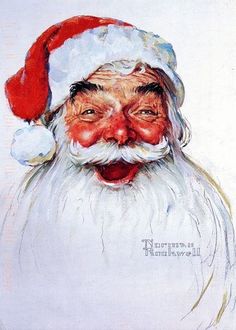The Surly Santa
If you have lived on the planet for any length of time and were born in a country that recognizes the Christmas season and its official delegate Santa Claus, you have had at least one traumatic experience around the holiday season that possibly scarred you for life. Of course, the revelation that the man in the red suit with sleigh and reindeer and a big sack of toys is one big hoax is traumatic enough. The curse of the Age of Enlightenment, I suppose. (Anyone reading this who might still be a believer STOP READING NOW!) Once we move beyond our childlike faith and into our adult play-along-for-the-sake-of-the-kids pact with the entire adult population in the western hemisphere, we become vulnerable to those very personal traumatic moments that transcend the unbearable discovery that Santa’s sleigh is pulled by a fleet of Mercedes Benz instead of Rudolf and his pals. Oh the horror. The horror.
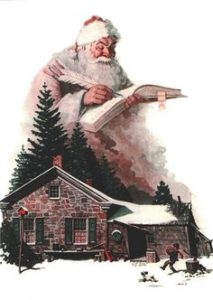
I first began to lose my faith when I started paying attention to the song “Santa Claus is Coming to Town.” I was able to understand that I had an inherent conflict with the lyric, “He’s making a list/checking it twice/gonna find out/whose naughty or nice.” With my proclivity for getting into trouble as a kid there was no way that I could trick an all-knowing/all-seeing Santa—maybe once, but certainly not twice—yet every Christmas morning there were presents under the tree with my name on it from the man himself. Was he that easily fooled?
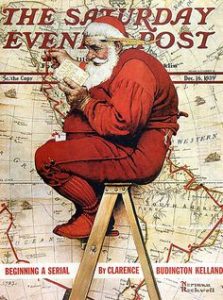
This began my intellectual slippery-slope, and when I began to calculate the world population with the number of houses, hamlets, and huts, Santa had to visit in a twenty-four period…well, you do the math. The only people in my life at that time with any authority to explain such matters were my parents, and when I began to question “the faith” as it were, they pulled me aside and ‘fessed up. But they welcomed me into the myth-making business by insisting that I must not tell my younger siblings. That might have been my first step into adulthood.
Once I became a jaded teenager I by-passed the Santa in the department store. While my brothers and sister took their turns on Santa’s lap making their requests known, I walked up and down the aisles stocked with irresistible items and made my own list that I submitted to the indisputable givers of Christmas gifts…the parents and the grandparents. That year I had my eye on a clock radio. I had a wind-up alarm clock used to rouse me out of bed in the pre-dawn hour so I could deliver newspapers on my paper route before school. But this relatively new combination of music and time in one device was revolutionary to me. A clock radio was pricey, and my parents reminded me that they “Weren’t made of money.” If this gift was to be acquired then economic forces would need to be marshaled: parents and both sets of grandparents would have to contribute to this purchase.
My parents played it cool in the days leading up to Christmas, never hinting that they were even considering such a gift let alone revealing any behind-the-scenes plotting and scheming with the grandparents. The big day came, and while I did not expect to see the clock radio Christmas morning under the tree left by Santa with the other gifts for my siblings, I was hoping that when we had the big family gathering and gift exchange later that day at my grandparent’s house, I would receive the only gift I requested.
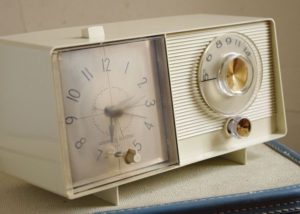
I have never mastered the virtue of patience and my parents were no help. They forced me to wait until all the gifts had been distributed to all the family members, and then they forced me to watch as each person opened their gift before my present was brought out. It was unconscionable. To add to the drama my mother pulled a chair into the center of the room and had me sit in it and put my hands over my eyes as the gift was placed in my lap. The packaging was certainly big enough to contain a clock radio, but when I jiggled the box the contents inside sounded like a bunch of loose parts rattling around.
Until that moment, I never really thought of my parents as having a sadistic, practical-joker side to their sterling characters. All eyes in the room were focused on me. I tore away the paper and yanked off the lid, and what to my wondering eyes should appear, but a jumbled mess of mechanical parts to what I assumed was my clock radio. It was a pile of metal junk with no instructions for assembly. If this was the best my parents could do even with economic support from the grandparents, then we really must be poor. There was silence in the room as everyone awaited my reaction, which after a few seconds of stunned disbelief, was a flood of tears. Not the reaction any of them expected to their “Dirty Santa” trick. All the contributors to this prank leapt from their seats and crushed me with love, comfort, and penance, and my father quickly got the real clock radio hidden behind the Christmas tree. Moral of this story: be careful what you wish for. My clock radio experience just deepened the layer of emotional discontent with the whole spirit of Christmas that began with the debunking of a sacred holiday character.
So why, decades later, once I was well into my career as a professional actor, would I accept the role of the jovial, old, fat man? I had much higher aspirations as an actor than donning a red suit and chortling the obligatory “Ho! Ho! Ho!” But as all actors who like to eat can attest, we accept employment wherever and whenever it is offered. And by this time in my life I had three other mouths to feed beside my own. Most of my acting jobs I’m proud to put on the résumé. This particular job has never made the cut, and I take issue with Czech writer, Milan Kundera’s quote, “There are no small parts. Just small actors.”
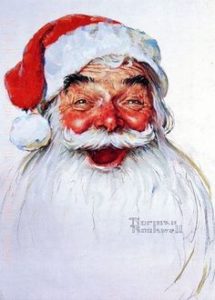
But no one likes a surly Santa and I was in no position to be a choosy beggar, so I swallowed my pride and suited up to play St. Nick at a big department store in a two-character skit (there was a Mrs. Santa performed by the spirited Clifton Harris), entitled “Breakfast With Santa.” An hour before the store opened each morning, parents and children would come to a big dining room on the top floor and have breakfast while they watched Mr. and Mrs. Santa dither over some great crisis that might thwart Christmas that year: sick reindeer, not enough presents, elves on strike, who knows? I’ve blocked out much of the memory that only psychotherapy could restore. After the skit, Mr. and Mrs. Santa split up and walked among the enthralled audience distributing candy and taking written gift requests from the little tykes. There were tables and chairs for more than one hundred paying customers to sit and eat a breakfast consisting of orange juice, bacon, and pancakes and syrup. We accepted a lot of lists doused in juice spillage and syrup residue.
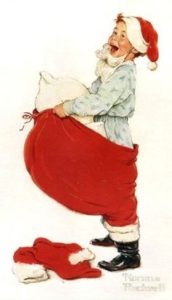
My costume was the standard black boots, white beard and hat, a two-piece red suit with the black buckle sewn into the coat, and a rotund, prosthetic belly. My Santa didn’t believe in eating salads. My pants were too long in the legs and I was constantly hiking them up. The artificial belly went on first and hooked in the back. Then I hiked up the waist and tied the pants on over the plump cushion with the drawstring. The prosthetic had such a wide girth that it was impossible for me to see my feet. When we moved into the audience after the skit, I constantly had to look over my paunch as if I were looking over a great precipice, just to keep from tripping. In one instance after a show, I remember the drawstring came untied and I had to use both hands to keep my pants from falling down (to see Santa in his Christmas skivvies would have cleared the room for sure), which meant I could not hand out candy or accept a kid’s written request. This left the job to Clifton who was working the opposite side of the room. The only problem was that there were so many tables in the hall, and Clifton had such a poor sense of direction that she kept getting turned around and going back to the same tables to get the kid’s lists like she was Bill Murray in a Christmas version of “Ground Hog’s Day.” On this particular day those kids who did not get their lists picked up would just have to mail them to the North Pole.

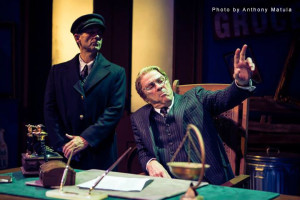
I don’t believe I caused the loss of faith in any one child that Christmas with my fake jolly Santa. I am a fair actor, after all, but as I stated, that role did not make the résumé. I have drawn on past Christmas tribulations for emotional authenticity to play two of the greatest Christmas curmudgeons ever written: Ebenezer Scrooge and Henry F. Potter. Now these characters have made the résumé. So in the spirit of the season I say: “Bah! Humbug!” and “Happy New Year, George Bailey…in jail,”—evil laughter followed by spoken line—and may you and yours have a trauma-free Christmas.

